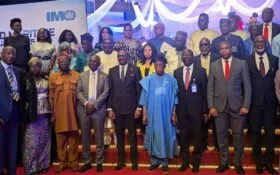The Minister of Marine and Blue Economy, Mr Adegboyega Oyetola, has called for sustainable financing and stronger partnerships to advance Nigeria’s expanding blue economy agenda.
Oyetola said interventions in marine infrastructure boosted non-oil exports by 18.6 per cent in the first half of 2025, underscoring the sector’s transformative potential.
He made this known at the 3rd Stakeholders’ Forum held in Lagos on Thursday, with the theme: ‘From Policies to Impact: Financing Issues.’
The Minister hailed the Federal Executive Council’s approval of Nigeria’s first National Policy on Marine and Blue Economy in May as a milestone for national growth.
He stressed that implementing the policy required collective effort and significant investment to modernise ports, expand aquaculture, strengthen maritime security, and build resilient coastal infrastructure.
“Finance is the catalyst that transforms policy into progress,” Oyetola said, urging investors, development partners, and global financiers to align with Nigeria’s blue economy vision.
Priority areas include sustaining Nigeria’s zero-incident piracy record in the Gulf of Guinea, scaling up fisheries, and unlocking opportunities in marine tourism and coastal infrastructure projects.
Oyetola highlighted recent achievements, including Nigeria’s three-year zero piracy record, made possible through the Deep Blue Project and ongoing rehabilitation of Lagos ports.
He said marine research, renewable energy, and environmental resilience should also be funded through innovative instruments such as blue bonds and sustainability-linked loans.
The Permanent Secretary, Mr Olufemi Oloruntola, added that deliberate public investment and stronger institutions were critical to driving growth in the blue economy sector.
Earlier, Hajia Ralthum Ibrahim, Director of Planning, Research and Statistics, described the forum as a timely platform to deepen dialogue and mobilise resources for implementation.
She said the ministry had developed a template to track initiatives, ensuring accountability across ports, aquaculture, fisheries, and marine tourism.
Ibrahim emphasised that finance remains the lifeblood of impact, adding that innovative models and private sector partnerships were being pursued to unlock opportunities.
A former Interior Minister, Emmanuel Iheanacho, commended the ministry’s efforts, stressing that unlocking the blue economy’s potential promises prosperity and sustainable development for future generations.
The forum gathered government officials, industry stakeholders, civil society, academia, and community representatives, all committed to sustaining Nigeria’s maritime potential.
(NAN)


